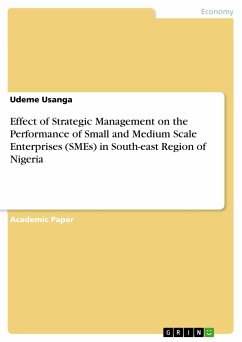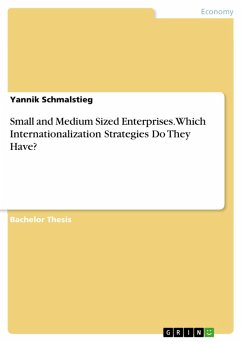Academic Paper from the year 2021 in the subject Business economics - Business Management, Corporate Governance, , course: Management Sciences, language: English, abstract: This study examined the impact of strategic management on SMEs performance in South-east Nigeria. A survey of 398 respondents were randomly selected from Small and Medium Enterprises (SMEs) that registered with the Ministry of Commerce and Industry in Abia, Anambra, Ebonyi, Enugu and Imo States were used for the study. Well-structured questionnaire was use for collection of data from respondents. Hypotheses were formulated and data analysis was performed with the using Frequencies, Percentages, and Regression Analysis. Result reveals that majority of respondents are male (57%), married (69%), with Secondary education (45%), with household size of 6-10 Persons (45%), with SME experience between 6 - 10 years (35.68%). Majority of enterprises in the study area were small -sized businesses (51.5%), providing services (65%), with fixed assets in buildings/factories including machinery/equipment worth N2 - 5 million (26%), current asset base of cash/draft at Banks and inventory/raw materials worth N2 - 5 million (31%), with human capital asset (number of employees) of 1 - 5 workers (51.5%) and number of branches (88%). About 96.5% did not apply any of the management strategy practices in their operations. Details of the results on the effects of strategic management practices on SMEs' Performance further showed an average mean of 4.19. The R2 of 74% of the variation in the dependent variable "employee training and job satisfaction is caused by the explanatory variable "Planning and Organizational Structure, with a probability value (t-cal = 34.014); environmental analysis strategy and resource allocation on market share (92%) with t-cal (66.76), implementation strategy and Customer Satisfaction (99%) t-cal = (165.015). The R2 of .860, about 84% of the variation in the dependent variable, Sales Revenue/Profitability by evaluation strategy with regression result, (t-cal = 49.496) indicate a positive effect. Based on the findings, the study concluded that the strategic planning process has not been fully implemented by SMEs operators in the South-east Region of Nigeria. The study therefore recommends that SMEs operators/managers should be motivated to align their performance to the planned goals in their strategic plan. If these elements are consciously integrated into SME business plans and judiciously implemented, there would be a stimulating effect on the overall performance of these enterprises; thus triggering growth, profit and sustainability.
Dieser Download kann aus rechtlichen Gründen nur mit Rechnungsadresse in A, B, BG, CY, CZ, D, DK, EW, E, FIN, F, GR, HR, H, IRL, I, LT, L, LR, M, NL, PL, P, R, S, SLO, SK ausgeliefert werden.
Hinweis: Dieser Artikel kann nur an eine deutsche Lieferadresse ausgeliefert werden.









